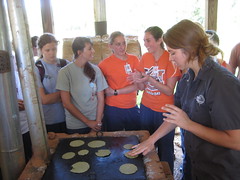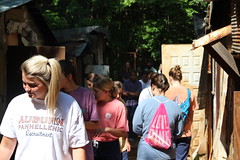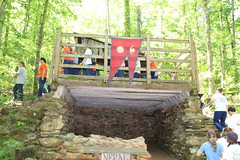Auburn, AUM nursing students transformed with trip to Lineville, Alabama
Article body
Whether or not Auburn and Auburn Montgomery nursing students travel to Quito, Ecuador or Malawi, Africa, to provide health care to women and children, they all get to travel to Lineville, Alabama for a simulated experience.
The small rural community is home to a Christian nonprofit organization called Servants in Faith and Technology (or SIFAT), where people from all over the world can learn practical skills to foster sustainable community development.
For Auburn and AUM nursing students, a trek around parts of the 176-acre campus in Randolph County is designed to show them the living conditions in places like Uganda, Bolivia, Liberia and Nepal without actually touring the world. They also see a slum or shantytown that would be found in an urban area.
SIFAT staff members explain how dwellings were made and how natives live and prepare meals. They also use a garden to teach students about sustainable production techniques.
“The SIFAT experience makes an impact on our students, whether or not they go abroad,” said AUM Assistant Professor Ginny Langham. “Extreme poverty and hunger, homelessness and malnutrition occur within the United States and Alabama, not just in Third World countries.
“With the high number of rural counties in Alabama, it’s vital that health care providers be knowledgeable of and sensitive to the unique needs of vulnerable populations. ‘Health Promotion, Disease Prevention’ is the mantra of our public health nursing course. The activities at SIFAT allow students to understand the significance of community education to promote healthy living and prevent illness and disease among those who are in need.”
About a decade ago, Auburn nursing students started making annual mission trips to Ecuador with SIFAT volunteers. In 2006, only students in the cultural course went to Lineville. All Auburn students began going there in 2010; AUM students began in 2013. Auburn and AUM faculty have been so impressed with SIFAT it is now part of the curriculum on both campuses.
Auburn Associate Professor Kathy Jo Ellison said she is grateful for the change in the curriculum for what the experience can add for students.
“They teach some core cultural values that are not part of the study abroad trips – how you empower and not hand out to inspire personal and community growth, how to give back without appearing superior,” she said. “They use interactive experiences to help students realize what it is like to be oppressed and feel hungry. They hear about the use of appropriate technology, how clean water can be produced with what you have on hand, and how health is taught and addressed in areas where there is no doctor. It can be quite powerful for students.”
In order to experience oppression and hunger, lunch is only served to a certain number of students. Those without a meal are left to watch others eat.
Auburn’s Leandra Milton was ready to eat lunch as she entered the dining hall. She had picked a white chip so she sat at the corresponding table. For the demonstration, it meant she would not be given a meal. The few students who picked red chips enjoyed a complete meal. The three or four tables that made up students with blue chips each shared a plate of tortillas. White chips went without.
“We all just sat and watched the people at the red table eat. After they finished eating, we talked about how we felt,” she said. “It was eye opening for me because this was a simulation of how the world eats. Most people eat very little or not at all, and if they do eat, it's not always nutritious. When all was said and done, everyone did get to eat, but I think we appreciated it more.”
In the garden, students learned how items like the leaves of a sweet potato plant could be dried, ground up and mixed with corn meal to make tortillas. The students also learned how to build a garden in a bag, a technique that is useful in environments where space is limited.
“I think this is going to make me a better nurse by helping me realize that not everyone is as fortunate as I am,” said Auburn’s Emily Higgins. “And being able to see how I can come up with cost effective ways to help the patient experience better healthcare.”
After a visit to Lineville, an Auburn Montgomery student shared the following with Langham:
“I feel like the SIFAT experience was a life changer for me. It has always been a dream of mine to do international medical mission work and do community health in rural areas. I just never knew how I could achieve that dream. After going to SIFAT, I felt as if a true vision for the rest of my life and a passion for the skill set I am acquiring unfurled before me. I would be the happiest person in the world if I could work as a community health nurse for communities all over the world offering education and appropriate technologies to improve the health and overall quality of life for others.
“I have realized just how important disease prevention is. Disease prevention and health promotion can be the difference between life and death. I will have the power to be that difference.
“I am not trying to earn brownie points or anything, but I just really wanted you to know that your class has empowered me and changed me in such a way that no other class has been able to in the history of my life. I have a renewed hope for the future and I have a reason to dream again.”
Langham said the student’s reaction is not unique, but accurately depicts the transformational learning that occurs after spending one day in Lineville.
“Anyone can schedule a visit to SIFAT,” she said. “My family has heard me talk about it so much, they all want to go.”
Related Media
Media interested in this story can contact Communications Director Preston Sparks at (334) 844-9999 or preston.sparks@auburn.edu.
Auburn University is a nationally ranked land grant institution recognized for its commitment to world-class scholarship, interdisciplinary research with an elite, top-tier Carnegie R1 classification, life-changing outreach with Carnegie’s Community Engagement designation and an undergraduate education experience second to none. Auburn is home to more than 30,000 students, and its faculty and research partners collaborate to develop and deliver meaningful scholarship, science and technology-based advancements that meet pressing regional, national and global needs. Auburn’s commitment to active student engagement, professional success and public/private partnership drives a growing reputation for outreach and extension that delivers broad economic, health and societal impact.







